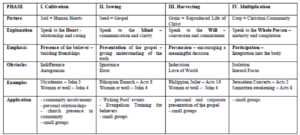¶720 CHRISTIAN EVANGELISM (LOCAL AND GLOBAL)
Biblical Principles
The modern church has tended towards a theology of evangelism that focuses primarily on
conversion, emphasizing the role of the believer to “win others to Christ”. It is important to re-affirm a broader view of God’s desire for “salvation” not just conversion. John Wesley describes salvation as follows:
“So the Salvation which is here spoken of might be extended to the entire work of God,
from the first dawning of grace in the soul till it is consummated in glory.” (Scripture
Way of Salvation)
Wesley took a broader view of “salvation” which includes “all that is wrought in the soul” by grace. God by his grace acts to draw us to himself: from a “natural” state in which we have little understanding of spiritual things, to an “awakened” state in which we are conscious of spiritual need of a relationship with God, to a point of conversion and subsequent growth to maturity in Christ.
Evangelism is not simply proselytizing and converting the lost, rather it is our cooperation with the Spirit of God already at work in the lives of those within our sphere of influence. The parable of the sower and the seed provides a useful model of this process of cultivation, sowing, and harvesting (Mark 4:1-20) as illustrated in the table shown below.
Practical Application
Understanding evangelism as PROCESS rather than EVENT only, frees the church to continuously work creatively to cooperate with the Spirit at each step of grace. Christian evangelism ultimately results in the multiplication of disciples and involves:
PRESENCE – individual believers, small groups, and churches engage in the lives of their
communities, both individually and corporately, being Christ to those around them.
PRESENTATION – ensure that believers are equipped to clearly enunciate the essentials of the gospel. Provide events attractive to spiritual “seekers” so that believers and small groups can develop relationships with them.
PERSUASION – within the context of relationship and community, there is a commitment to make clear, purposeful, presentations of the gospel.
PARTICIPATION – the harvest is incorporated with new believers being led to maturity in Christ and to be effective witnesses of the gospel.
The following table provides examples of these types of evangelistic activities:

[Adapted from K.C. Hinckley, Living Proof: A Small Group Discussion Guide (NavPress, 1991)]
- “Becoming a Contagious Christian” seminars are recommended for training people to understand themselves and how they can be natural witnesses. The seminar identifies the following six styles of evangelism and helps people to understand what their natural style is and how it can be used effectively:
- Confrontational style
- Invitational style
- Intellectual style
- Interpersonal style
- Serving style
- Testimonial style




